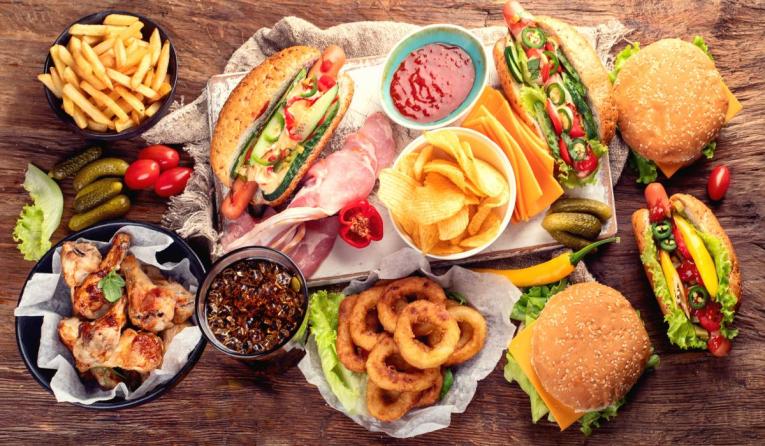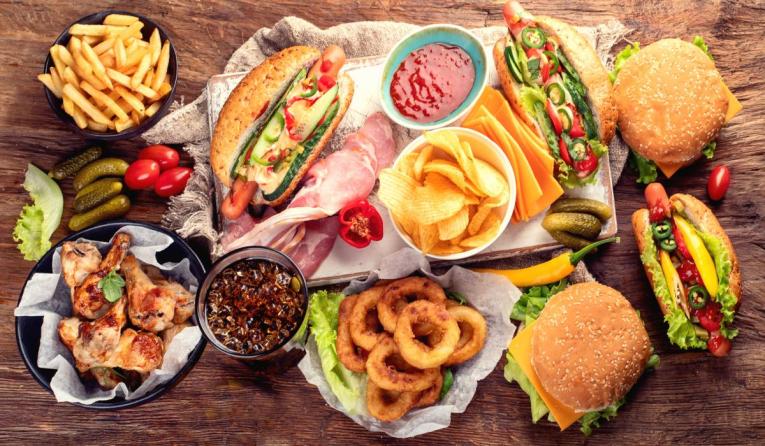Effects of Eating Fatty food

Greasy foods are common not only in fast food restaurants, but also in office meals, restaurants, schools, and even many people’s home menus. Greasy foods are those that are fried or cooked with a lot of oil. Fries, pizza, onion rings, cheese sticks, and donuts are among them.
- BLOATING, stomach upset, and diarrhea
Fat is the slowest digesting macronutrient after carbs, fat, and protein. Because greasy foods are high in fat, this nutrient slows stomach emptying, causing bloating, nausea, and stomach pain.
High-fat foods can cause stomach pain, cramping, and diarrhea in people with digestive conditions such as irritable bowel syndrome (IBS), chronic pancreatitis, or an upset stomach. - Reduce the diversity of your gut microbiome
Fatty foods have been shown to harm the good bacteria in the gut. These probiotics help with:
Digestion of fiber. Our gut bacteria degrade fiber to produce short-chain fatty acids (SCFAs), which have anti-inflammatory properties and may help prevent digestive disorders. Immune booster. The gut microbiota interacts with immune cells to help regulate the body’s response to infections. Weight management. A high-fat diet, such as fried foods, can harm your gut microbiome by increasing the number of harmful gut bacteria while decreasing the number of beneficial bacteria. Obesity and other chronic diseases such as cancer, heart disease, diabetes, and Parkinson’s disease are the result of these changes. - CAN RESULT IN WEIGHT GAIN AND OBESITY
Greasy foods, especially those cooked with a lot of fat, can cause weight gain due to their high calorie count. A small baked potato (3.5 ounces or 100 grams) contains 93 calories and 0.1 gram of fat, whereas the same amount of French fries contains 312 calories and 15 grams of fat.
Obesity has been linked to a variety of negative health outcomes, including heart disease, diabetes, stroke, and some cancers. A high level of trans fat in the body, in particular, can cause weight gain. Despite usage restrictions, fats can still be found in many greasy foods due to the use of hydrogenated vegetable oils in frying and food preparation.
- May increase the risk of cardiovascular disease and stroke.
Fatty foods are bad for your heart in a variety of ways. Fried foods, for example, have been shown to raise blood pressure, lower HDL (good) cholesterol, and cause weight gain and obesity, all of which are associated with heart disease. According to research, potato chips cause inflammation and may contribute to heart disease.
Furthermore, the frequency with which you consume fried foods may be related to your risk of developing heart disease. According to one study, women who consumed one or more servings of fried fish per week had a 48% higher risk of developing heart failure than those who consumed only three servings per month.
5.BRAIN FUNCTION DETERIORATION
A high-fat diet can cause problems with brain function. Weight gain, high blood pressure, and the metabolic syndrome caused by fatty foods have also been linked to brain structure, tissue, and functioning damage. A diet high in fatty and fried foods reduced learning and memory and increased inflammation, according to two large studies involving 5,083 and 18,080 people. Furthermore, trans fat-rich diets have been linked to impaired brain function. Higher saturated and trans fat intakes were linked to poorer memory and lower work productivity in a study of 38 women.
If fatty foods should be eaten, it’s recommended that you consume at lower rates.
¶ slgrace
¶ health
Like, comment and share with your love ones.
Visit Slgracemedia.com for more Health Post and Tips.








Id like to thank you for the efforts you have put in penning this site. Im hoping to see the same high-grade blog posts by you in the future as well. In fact, your creative writing abilities has inspired me to get my own site now 😉
Your article helped me a lot, is there any more related content? Thanks!
Very informative! Your insights are highly valuable. For additional details, check out: LEARN MORE. What are everyone’s thoughts?